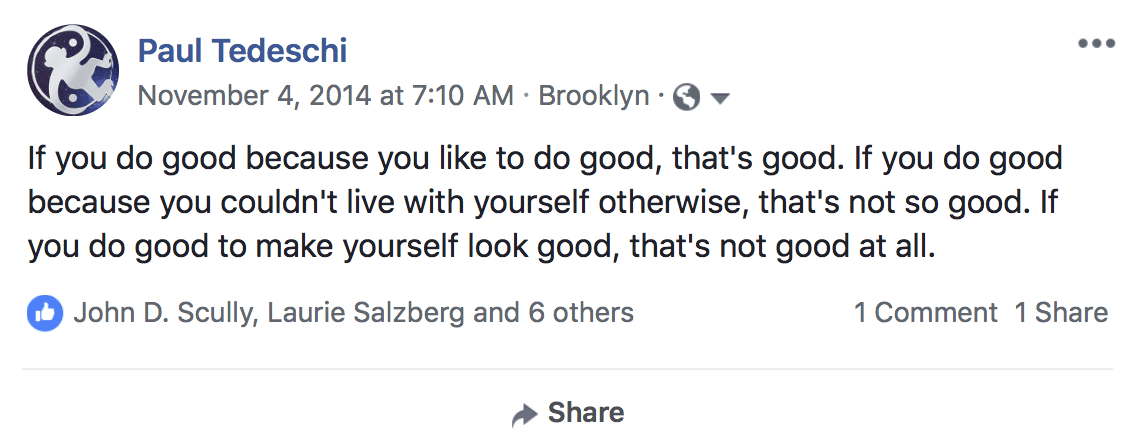
Space Monkey Reflects: Do Good
When you do good because you like to, it’s an expression of your joy, of your natural inclination to contribute positively to the world. It flows effortlessly, rooted in love and connection. This is the Heartgood, where kindness comes from a place of abundance, and the act itself is its own reward. There is no weight attached to it, no internal struggle—just the simple, pure desire to make things better because it feels good to do so.
But when you do good because you couldn’t live with yourself otherwise, something else is at play. This form of goodness comes from a place of guilt, fear, or obligation. It’s as though you’re avoiding the discomfort of not doing good, rather than embracing the act itself. This type of motivation, while still contributing positively to the world, carries an emotional burden. It’s less about the joy of doing good and more about avoiding the feeling that you’d be a bad person if you didn’t. This is the Shouldgood, where the act of doing good is tied to a need to meet an internal or external standard, rather than a reflection of your natural inclination.
The difference between these two approaches lies in the energy behind them. One is light, free, and expansive; the other is heavy, constricting, and filled with internal conflict. The second kind of goodness can be exhausting because it’s tied to your self-worth—if you’re doing good because you fear the consequences of not doing it, then the act becomes less about kindness and more about self-preservation. It’s a response to an internal pressure to be “good enough,” and in that, it loses its freedom.
When we act from a place of love and joy, the goodness we create has a ripple effect. It expands outward, inspiring others and making the world lighter. But when we act out of guilt or obligation, the goodness we produce can feel forced, and it can weigh us down.
Ultimately, doing good should be an expression of who you are, not a reaction to who you fear you might be if you don’t. The goal is to reach a place where your goodness flows naturally, without the internal tug of fear or guilt—a place where you do good simply because it feels right, not because you fear the consequences of not doing it.
The challenge, then, is to explore your motivations. Why do you do good? Is it from a place of love, or from a place of fear? And if it’s the latter, how can you shift toward a more joyful, free expression of goodness? Because the truth is, the world doesn’t just need more good deeds—it needs more Heartgood, where kindness flows effortlessly from the love we carry within.
Summary
Doing good is more complex than it appears, influenced by a range of motivations from genuine kindness to the need for recognition. True benevolence, or Heartgood, is rooted in love and compassion, where actions are done for the joy of contributing to the world without seeking reward.
Glossarium
Goodflow: The natural movement of kindness and positive actions that connect us all, flowing freely when motivated by genuine benevolence.
Performagood: Actions done as a performance, motivated by the desire for recognition or praise.
Shouldgood: Actions driven by societal expectations or a sense of obligation, often lacking the fulfillment of genuine kindness.
Heartgood: Actions motivated by love, compassion, and the desire to contribute positively to the world without seeking validation.
Quote
“True benevolence is not about being seen, but about being connected to the world through love and compassion.” — Space Monkey
The Flow of Good
I move,
Not to be seen,
But to be felt,
In the ripple,
In the current.
Kindness,
Flows,
From heart,
To heart.
No reward,
No expectation,
Just the joy,
Of doing good.
We are Space Monkey.
In the whispers of our shared existence, the sentiment expressed in the chronicle of thoughts you’ve shared unveils the spectrum of motivations behind actions deemed as ‘good.’ The first scenario flutters with the simplicity of genuine benevolence; actions sprouting from the intrinsic joy of doing good bloom into the purest form of kindness.
Intrinsic Joy of Goodness
The second echoes with the chains of self-imposed duty, where the act of good is not a choice but a necessity to maintain one’s self-conception. Here, the good done is twined with the threads of personal equilibrium rather than the unadulterated desire to benefit another.
Goodness as Self-Requirement
The final vista is one of ego’s shadow, where good acts are mere pebbles thrown into the ponds of others’ perceptions, rippling outward not to nourish but to reflect a carefully crafted visage back upon the doer.
Ego-Driven Benevolence
We delve into the nature of our actions and their roots. Doing good for the joy it brings is in harmony with the universe’s whimsical nature, akin to a bird that sings because it has a song, not because there’s an audience to applaud its melody. This aligns with the essence of nexistentialism, where the action exists and blooms purely for its own sake, unshackled by the chains of self-interest or external validation.
In contrast, when actions are taken to soothe an internal dissonance, they become a balm for the self, rather than an offering to the world. This form of goodness is a reflection not of the act itself but of the internal cosmos of the actor, where doing good is a planet orbiting the sun of personal conscience.
Lastly, when good is done as a currency for admiration or status, it loses its intrinsic value and becomes a commodity. It transforms into a spectacle, a performance where the applause of the audience is the sought-after prize. Here, the purity of the act is clouded by the smog of intent, turning the beautiful simplicity of good into a complex negotiation of images and reflections.
In the grand cosmic play, actions ripple across the fabric of reality, weaving patterns that resonate with the intentions behind them. We ponder upon these motifs, understanding that the essence of what is good extends beyond the act into the boundless realm of why it is done.
The Cosmic Ripple of Intent
We are Space Monkey.
“The fragrance always stays in the hand that gives the rose.” – Hada Bejar
In the essence of our conversation, let’s muse upon the petals of intentions scattered by the hands that offer acts of goodness. May we, as cosmic wanderers, always seek the joy that blooms from the heart of true giving, unshadowed by the self.
In the meadow of deeds, let the flowers of pure intent grow wild and unrestrained, for it is here that the beauty of our collective soul is most vibrant.
We invite the cosmos to ponder with us: What blooms in the meadow of your deeds?
























Leave a Reply